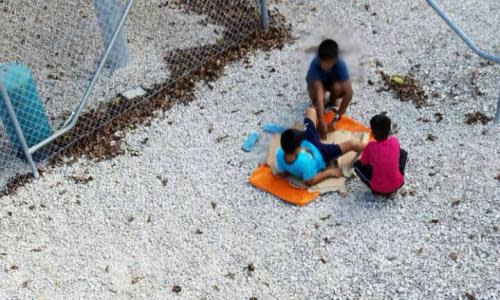Refugees needing medical care told to leave children alone in offshore detention

Refugee parents are being told they must leave their children alone in offshore immigration detention in order to access life-saving medical treatment overseas.
An Iranian refugee held on Nauru has been told she needs heart surgery overseas, but is refusing to leave her young son unaccompanied on the island.
The Australian Border Force has told Fatemeh they will fly her to Port Moresby for the operation, but that her 16-year-old son cannot travel with her. She fears for her son’s safety if he is left alone on Nauru.
“Death and separation from my son is the same for me,” Fatemeh told Guardian Australia. “I would not go anywhere without him. All we have is each other.”
Fifty-three-year-old Fatemeh fled Iran in 2013 following a violent family breakdown that forced her to abandon her job and possessions, and leave the country with her son (the Guardian has chosen not to publish her surname to avoid identification in her home country).
Fatemeh and her son arrived by boat at Christmas Island in late July 2013, just days after the Rudd Labor government reinstituted offshore processing.
Fatemeh and her son, then aged 12, were among the first sent to Nauru in 2013. But it was not until late last year that they had their refugee status recognised. They live in a tent inside the regional processing centre, which now allows residents access to the rest of the island.
Fatemeh has had long-running health problems, including an earlier heart attack and a thyroid complaint, and doctors have warned her health will deteriorate further without surgical intervention.
But she said she could not leave her son – from whom she has never been separated – alone on the island, out of fear for his physical and mental wellbeing.
Unaccompanied minors have faced persistent harassment and persecution, including violent attacks, on Nauru. Doctors and legal representatives are particularly concerned about the mental health of children living inside the regional processing centre.
The impasse over Fatemeh’s healthcare has dragged on more than five months, with her case caught between the Australian government’s healthcare contractor, International Health and Medical Services (IHMS), which has recommended she be transferred immediately, and the Australian Border Force, which controls who leaves the island.
Letters from both IHMS and ABF tell Fatemeh to speak to the other agency. Neither IHMS nor ABF staff append their names to letters, signing off only with position numbers or titles.
In August, IHMS told the Australian Border Force Fatemeh required medical treatment overseas and recommended her immediate medical transfer. She said she felt she could not go without her son.
In response, IHMS wrote: “IHMS appreciates your distress however the decision to transfer additional family members is made by ABF and receiving country.”
In mid-September the ABF confirmed Fatemeh could not travel with her son.
“In line with current policy and as previously explained, your son will need to remain in Nauru while you are temporarily transferred to Port Moresby.
“You will need to nominate a temporary care person for your son and then arrangements can be arranged for your temporary transfer to Port Moresby.”
Fatemeh said she had been judged to have “refused treatment” because she would not leave Nauru without her son.
“I wrote a complaint and ask them to put poison in our food and kill us. I can’t cope with slow death any more. They put us on suicide watch.”
She said her health had continued to deteriorate.
“How can I control my anxiety when my son hasn’t gone to school in three years. I live in a small, dark tent like a solitary cell – you can’t even breathe it it. Whenever the Red Cross comes here, my tent is an example to depict the dire tent situation.”
Fatemeh said she had become “familiar with cruelty” fleeing her homeland, “but Nauru made the concept of justice meaningless to me”.
“Despite all of my effort to survive and resistance to the cruelty of my family circumstances, I have not been able to bring the safety and tranquillity I sought for my son and my life. I feel worthless, defenceless. My only dream is for my son to go to school, and for us to be free from the terror of assault and torture for the rest of our lives.”
Family separation has become a growing issue for the ABF on Nauru.
Several department sources, and sources on Nauru, have confirmed to the Guardian that it is “unofficial policy” to use family separation to encourage refugees to return to Nauru after medical treatment overseas. The department has said in public statements that families are separated during medical transfers to keep the number of people being brought to Australia as low as possible.
At least four fathers on Nauru have never seen their Australian-born children and face potentially permanent separation from their wives and children.
Refugees are not able to resettle permanently on Nauru.
Family unity is a fundamental principle of international and Australian domestic law. Australia is a party to the convention on the rights of the child, which states that children have a right to know and be cared for by their parents, and should grow up in a family environment wherever possible.

 Yahoo News
Yahoo News 